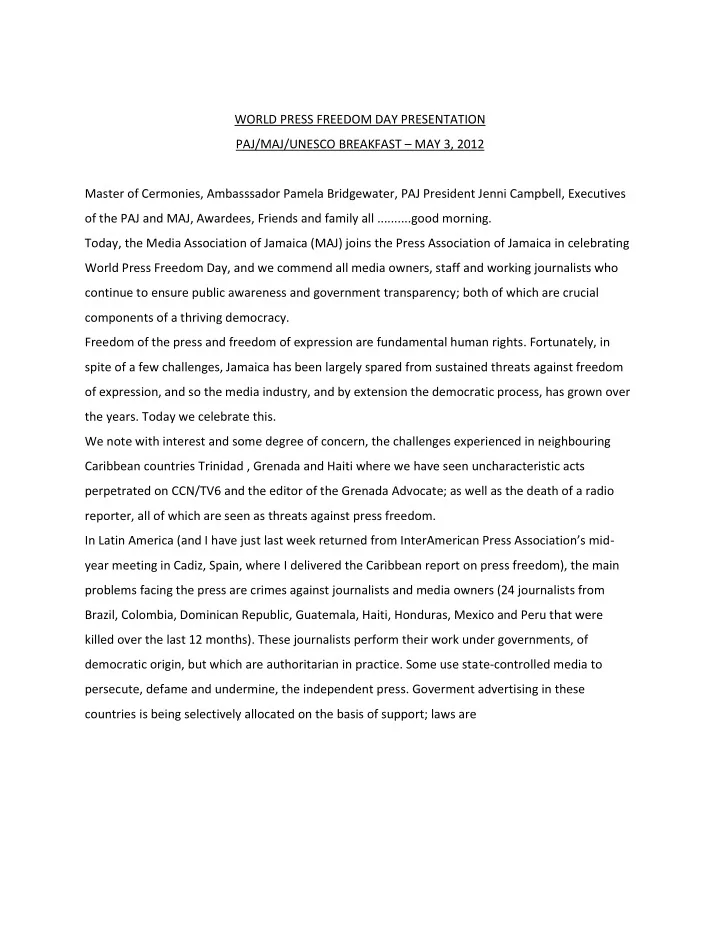

WORLD PRESS FREEDOM DAY PRESENTATION PAJ/MAJ/UNESCO BREAKFAST – MAY 3, 2012 Master of Cermonies, Ambasssador Pamela Bridgewater, PAJ President Jenni Campbell, Executives of the PAJ and MAJ, Awardees, Friends and family all ..........good morning. Today, the Media Association of Jamaica (MAJ) joins the Press Association of Jamaica in celebrating World Press Freedom Day, and we commend all media owners, staff and working journalists who continue to ensure public awareness and government transparency; both of which are crucial components of a thriving democracy. Freedom of the press and freedom of expression are fundamental human rights. Fortunately, in spite of a few challenges, Jamaica has been largely spared from sustained threats against freedom of expression, and so the media industry, and by extension the democratic process, has grown over the years. Today we celebrate this. We note with interest and some degree of concern, the challenges experienced in neighbouring Caribbean countries Trinidad , Grenada and Haiti where we have seen uncharacteristic acts perpetrated on CCN/TV6 and the editor of the Grenada Advocate; as well as the death of a radio reporter, all of which are seen as threats against press freedom. In Latin America (and I have jus t last week returned from InterAmerican Press Association’s mid - year meeting in Cadiz, Spain, where I delivered the Caribbean report on press freedom), the main problems facing the press are crimes against journalists and media owners (24 journalists from Brazil, Colombia, Dominican Republic, Guatemala, Haiti, Honduras, Mexico and Peru that were killed over the last 12 months). These journalists perform their work under governments, of democratic origin, but which are authoritarian in practice. Some use state-controlled media to persecute, defame and undermine, the independent press. Goverment advertising in these countries is being selectively allocated on the basis of support; laws are
enacted to restrict editorial content; and approval of laws aimed at greater transparency is being withheld. In one extreme it is said that one president from the region has insisted that information is a public service and, therefore, must be managed by the state. Cases of impunity are numerous in Latin America and paint a grim picture for press freedom in the region. IAPA has urged all Organization of American States member governments to defend the system and in particular, the autonomy and work of the Office of the Special Rapporteur for Freedom of Expression, a body which since its creation in 1998 has contributed to guarding and strengthening citizens’ right to freedom of expression in each nation of the Americas. Though we in Jamaica have not lost any of our media workers due to violence as a direct result of the work they undertake, we must continue the fight to secure press freedom and security for all media workers and media organizations- we as a country cannot afford the slightest deterioration of the environment we currently enjoy. As important to press freedom as protecting our media workers, is the need for media to operate in an enabling environment with respect to policy. Laws, such as the Defamation Laws and the Access to Information Act must be amended to enhance transparency and accountability in Government; facilitate the free operation of media and give voice to issues and concerns of the people. In light of this, the MAJ had submitted to the Joint Select Committee of Parliament a paper highlighting challenges and introducing recommendations to improve the Access to Information Act. The Act is still yet to be reviewed and finalized by the relevant authorities, and we will continue our lobbying efforts until this is done. Gradual progress has been made in the review of the Defamation Laws since hearings began in 2009. The Joint Select Committee of Parliament made its recommendations which include several progressive amendments (such as the much needed abolishment of criminal defamation) however, they haven’t addressed the critical issues of the burden of p roof and the
level of accountability demanded from public officials. Last month an appeal was made to the Government urging them to give the Bill priority and have it passed this year. During discussions held with the Minister of Justice, the MAJ pointed out a few technical issues in the wording of the Bill and ommissions that ought to be addressed. We await their response. The MAJ is also currently reviewing policy recommendations from the regulatory body The Broadcast Commission which, while aspects can be argued are designed to take the industry into a more modern environment; have great potential to be crippling to many media houses and threaten the viability of the industry; posing an indirect (and I am a quick to say likely unintended) threat to press freedom in our country. We will engage in meaniningful and respectful (and perhaps dynamic) consultation with both the regulator and the relevant government ministries to ensure any changes agreed for the way forward are in the best of interest of the industry and the country. On a sad note, and yet another threat to press freedom, however in a different and unavoidable way, the industry has lost many stalwarts such as Wilmot “Motty” Perkins, Anthony Abrahams, John Maxwell, Karl Young, Bradley Morgan and Basil “Bagga” Brown, to name a few. Their contributions to the industry will long be remembered and respected. We must today renew our commitment to defend against this threat on press freedom by creating and filling the pipeline with journalists and media managers who bring with them passion and dedication equal to or greater than those we have lost. We have a bright future to maintain. In closing I leave you all with this: The decisions we make today will determine the path that our own country will take in the battle for press freedom and by extension protection of human rights. Thank you for your time and again congratulations to those of you who help to make this line of work most rewarding.
Recommend
More recommend